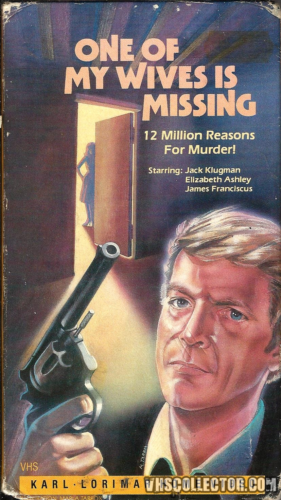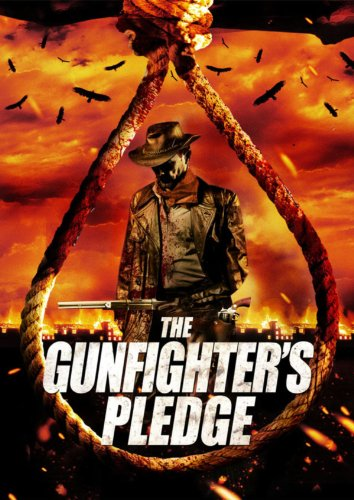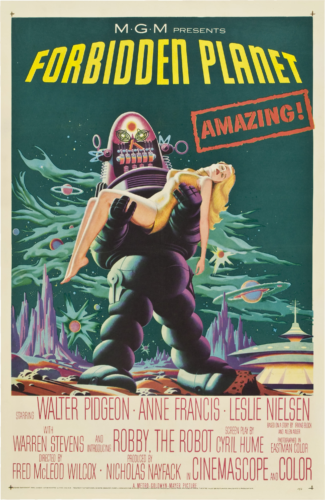 One of My Wives is Missing (1976) – The title unfortunately makes it sound like a comedy, but it’s actually a mystery/thriller TV-movie based on a stage play called Trap for a Single Man (and my daughters have seen a production under the title Catch Me If You Can).
One of My Wives is Missing (1976) – The title unfortunately makes it sound like a comedy, but it’s actually a mystery/thriller TV-movie based on a stage play called Trap for a Single Man (and my daughters have seen a production under the title Catch Me If You Can).
Jack Klugman is a small-town police chief who gets a frantic call from honeymooner James Franciscus: His new bride drove off after an argument and disappeared two days ago. But as the chief starts investigating, the wife returns. At least, she says she’s the wife, and she’s got the receipts to prove it — but the husband swears he’s never seen this woman before in his life.
It’s an engaging little play-turned-movie (the confined locations make that very obvious), all up until the last ten minutes. Then there’s one more twist that invalidates half of the story and runs this into Rube-Goldberg-on-meth territory.
(No trailer available, alas.)
 A Gunfighter’s Pledge, aka The Pledge (2008) – Luke Perry is a sheriff who turns bounty hunter when his wife and child are killed by outlaws gunning for him. In trying to take down his quarry, he accidentally kills an innocent man who was looking for gunslingers to help protect his property from a rapacious landowner, so he takes the protecting on himself. And wouldn’t you know it, the rapacious landowner (C. Thomas Howell) just happens to hire those same outlaws as muscle to force the family out.
A Gunfighter’s Pledge, aka The Pledge (2008) – Luke Perry is a sheriff who turns bounty hunter when his wife and child are killed by outlaws gunning for him. In trying to take down his quarry, he accidentally kills an innocent man who was looking for gunslingers to help protect his property from a rapacious landowner, so he takes the protecting on himself. And wouldn’t you know it, the rapacious landowner (C. Thomas Howell) just happens to hire those same outlaws as muscle to force the family out.
Sure, it’s all cliche, but it can be entertaining nonetheless. I’m pretty sure I recognized the beleaguered family’s hacienda from Avenging Angel (2007), a Kevin Sorbo western I saw a couple of years ago, and so that ended up being my standard of comparison. (Pledge is better.)
 Forbidden Planet (1956) – How old was I when I saw this last? Twelve? Young enough to be disenchanted by the story being so much propelled by a bunch of lonely spacemen wanting to romance the first girl they’ve seen in months.
Forbidden Planet (1956) – How old was I when I saw this last? Twelve? Young enough to be disenchanted by the story being so much propelled by a bunch of lonely spacemen wanting to romance the first girl they’ve seen in months.
This is loudly proclaimed to be the best SF movie of the 1950s (or even up to that point). It probably is — and in claiming that title, it showcases many of the problems to be found both in cinematic science fiction and in the print version of that era: shallow characterization, presentism in social mores, and a blindness to exploring the full implications of technological advances in favor of simply letting them move the plot forward. (Yeah, I’m probably going to be hearing about it…) Yes, it was groundbreaking especially in its use of the realized Id as a “villain,” but that’s late in the game.
I’m not blaming the movie, I’m blaming the soil in which it grew. While I recoil at the idea of a current-year remake of Forbidden Planet (as it would be such a vessel of current-day presentism and virtue-signaling to make the original look like a piker), I still wish that a post-Dangerous Visions version had been made by someone at some time, just so I could compare and contrast.
Oh, sorry…I confess it. I love FP. I do. Not as much as some things, but it has a spot on my shelf in my _oeuvre_ of world-class B movies. And in the “social mores’ category, holy hell…I have yet to see anything made in the last decade, or more, even that isn’t busy lecturing me about what I should think, what I *shouldn’t* think, and so on. It’s appalling and infuriating. If I wanted to be lectured, I’d ask my husband a question, not some pimply-faced movie-making whiz kid.
Is it the Tombstone of 1950’s SF movies? No. It’s not. But it’s a good many things, and given that they started out with Shakespeare, what the hell. And who does NOT wuv Robbie? And the Robbie-mobile? MWAHAHAHAH. And the moonshine..ah…FP, someone out here still loves you.
(Let’s just pray that that same pimply-faced whiz kid doesn’t decide to do to this what Spielberg did to WOTW, God help us, or whoever it was in the Keanu Reeves remake of TDTESS (OHEMGEE, kill me now! Talk about idiotic, emo “lecturing” about how tech bad, and everybody is gonna live all happy without electricity and everything else, what utter childish drivel and the acting sucked too.).
It’s bad enough that I keep hearing about a The Thin Man remake, which makes me want to projectile vomit. (Not to mention, in the B-movie stack, almost in your own home, ROADHOUSE, with Jake Gyllenhaal, god help us all, in Patrick Swayze’s role. ARRGHGHGHG.)
Oh, I still profess love for FP. I just also realize that the bar for “GREATEST SF MOVIE UP TO NOW” really wasn’t that high.
Yabbut…..drum roll, please:
What *does* make your shortlist of “GREATEST SF MOVIE UP TO NOW”, eh? And how narrowly are we conscribing (limiting) this? Does it have to be a theatrical release, a movie of two, say, three hours? And can it be a miniseries? Or “limited release” series, as they call them now?
Dang. I would really have to think HARD about this question, even if limited to theatrical releases only.
Hitch
Up to NOW-now, or up to THEN-now?
Hmmm….that’s an excellent question. I mean, if we start defining limits (pre-1980’s) or the like, we are artificially messing with the bar. So…I guess, from early sci-fi silents, right up until…NOW.
Hitch
The original PLANET OF THE APES is right up there. Maybe BLADE RUNNER and THE MATRIX, too. (Note: I’m defining them as “the best movies that show up under the SF genre,” not “the movies which best exemplify SF.”)
It’s very hard for me not to talk up Alien, of course; you are absolutely right to include BR and POTA.
Matrix…now, I get very ambivalent there. The first one? You betcha,but the movies’ plotlines and gist and thrust meandered all over the place on the ensuing two, er, three if you wish to be generous.
Hmmm…gotta think about this one. I’m a huge fan of TDTESS, too (original only, Michael Rennie, yum…) and a few others. I do admit, I tend to lean toward the classics. And what about 2001?
Hitch
See, there’s your problem. There was only one MATRIX movie.
Ah, TDTESS – *that* one should have been the best SF movie up to “now” (i.e, then).
Of course, Forbidden Planet is pretty much what inspired Gene Roddenberry to make the original Star Trek series. It’s no accident that the whole movie feels a bit like a long episode of that show without Spock (or maybe like the pilot episode “The Cage” in which it was not yet established that Spock and his fellow Vulcans were supposed to suppress their emotions). Another inspiration worth seeing would be the 1965 Italian-made movie Planet of the Vampires which took a few more chances with the social mores of its time than most movies did (particularly with its morally ambiguous ending), although it’s still very much a period piece that’s showing its age these days.
For all the ways it guessed wrong about the future (particularly the all-male crew; Planet of the Vampires and Star Trek more rightly guessed space-faring explorers of the future would want to have women in their crews too), I’d say at least Forbidden Planet had a fairly cerebral plot in having the characters gradually discover how and why the titular planet’s super-advanced civilization (with matter replicators something like the ones in Star Trek: The Next Generation and all further series set in that era) accidentally destroyed itself. Also, while the story does draw a very clear line between protagonist and antagonist (Commander John J. Adams and his honorable-if-somewhat-lusty crew vs. the rather arrogant and cantankerous Doctor Edward Morbius), it’s not a simplistic hero vs. villain conflict. In fact, had the protagonists immediately managed to gain full access to the ancient Krell technology over the antagonist’s protests as they wanted, it might well have destroyed them all just as it did its previous users, and this would have been a horror movie with a downer ending reminiscent of Agatha Christie’s And Then There Were None.
The three main flaws I see in Forbidden Planet‘s writing:
1. In terms of “Yeah, that didn’t age too well,” I’d say the most egregious error the writers made was assuming that the spaceships of the future would be exactly like the military ships of the present: a (mostly) all-white and (definitely) all-males-in-their-physical-prime crew who would all naturally start trying to get their grubby mitts on the first pretty girl any of them have seen in some thirteen months at sea (though courtesy of Hollywood’s Hays Code, the men in this story are decidedly more polite in their seduction attempts than any real military naval crew on shore leave ever was back in the day).
2. In terms of “Yeah, way ahead of you on that one, old-timers,” probably the most hilariously erroneous prediction about future technology was the ancient Krell civilization’s technology being based on what looks to be a planet-sized underground computer network (while the flying-saucer-style human ships seem to be able to operate with little to no computer technology at all); but we’ll cut them some slack, as apparently just about nobody predicted the invention of solid-state transistors and then microchips leading to the creation of personal computers and then laptops and handheld computing devices in the decades between then and now.
3. Finally, there’s the “Why does that technology even exist?” nitpick, for which the prize definitely goes to the planetary self-destruct mechanism the late Krell civilization casually left lying around for the likes of Doctor Edward Morbius to find (and ultimately use; that’s not too much of a spoiler, I hope): while it’s understandable that a planet-sized network (which was apparently intended to be a planetary power plant as well as a regulatory computer system) could potentially be rigged to cause a chain reaction large enough to blow up the entire planet, what kind of highly advanced, peaceful, rational, and politically unified species would ever consider it a good idea to build a trigger for that right into their system? (Maybe those Krell weren’t as morally advanced and politically unified as Morbius supposed after all?)
Bottom line: Forbidden Planet definitely deserves both all the praise and all the criticism it’s received ever since its release. All the same, I agree with Hitch that I wouldn’t really want to see a remake of it in our time, as any such would inevitably be a preachy morally myopic virtue-signaling woke-fest, just like what happened to the Star Trek franchise it inspired (and so many, many other franchises). Again, I also recommend seeing Planet of the Vampires as a kind of spiritual successor to this movie (and another early prototype for the original Star Trek series).
(Warning about Planet of the Vampires: as with Forbidden Planet leaving you to wonder what’s so “forbidden” about the titular planet for most of its run time, Planet of the Vampires will probably have you asking “Where the heck are those vampires the title mentioned?” As with Forbidden Planet revealing that the Krell technology is pretty much what’s “forbidden” in its ending, who the vampires are is also only revealed near the end of Planet of the Vampires in its final plot twist.)
I would say what I think would happen, if a remake of FP, were made today, but all I’d need is some wanker to see it and decide I’m evil. (sigh). But I think those of us with an IQ above room temp all know *exactly* what would happen, who would be the BAD GUY (Morbius, straight white guy) and…all the usual.
Hell, look what they did to TDTESS. That was pretty bad all by itself. And I don’t think that they were even really TRYING to “wake it up.” I think they put all their eggs in the “you have too much technology and are killing the planet” message.
sigh.
I love telling people that PLAN 9 FROM OUTER SPACE is just “THE DAY THE EARTH STOOD STILL with zombies” and watching their faces.
Double bonus from Planet of the Vampires: Some costumes, especially helmets, were re-used decades later in Starcrash (shaggy ’70s hair poking out from underneath those helmets it just one of the charms Starcrash has to offer).